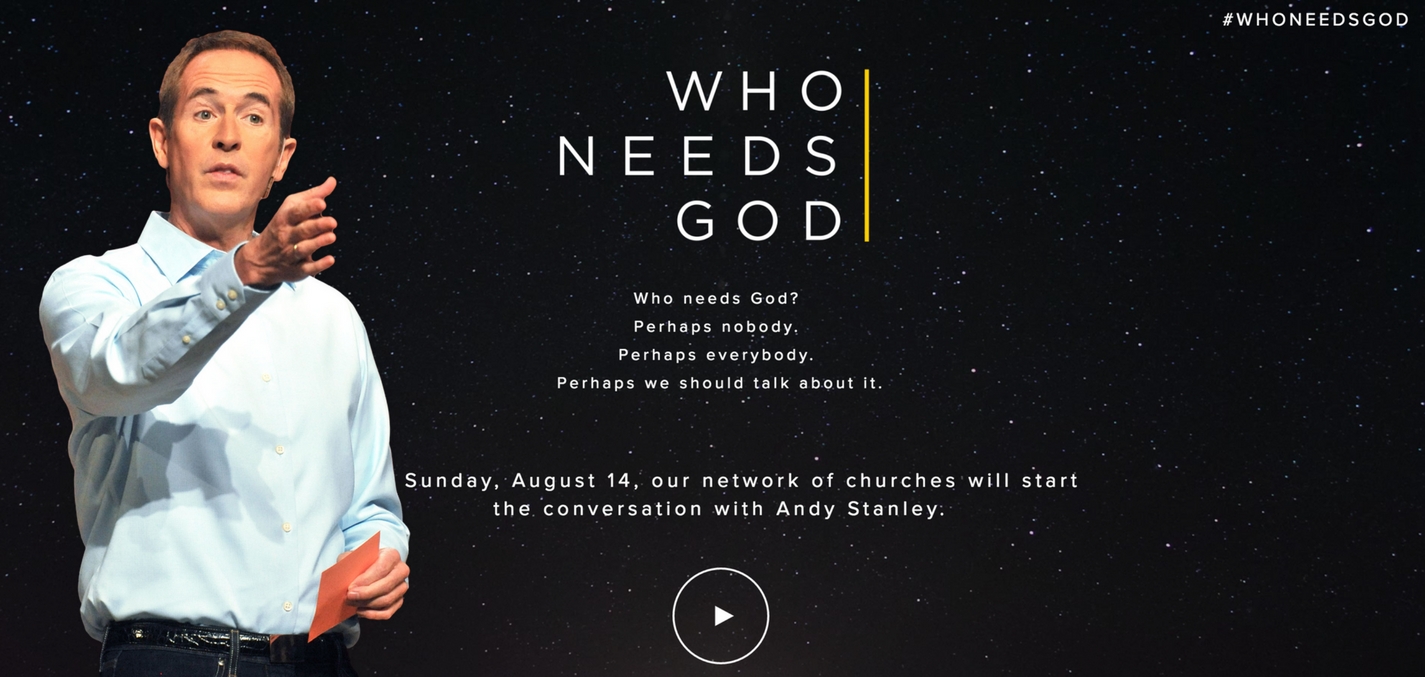At our parish men's group we are watching the Who Needs God videos by Andy Stanley. They are quite well done. We have not made it through the whole series yet but he is making some of the same points I have made. He makes them a lot better. He is an exceptional communicator. The basic message is that the rise in atheism has nothing to do with the notion that atheism has suddenly become appealing. In fact, many who leave Christianity do not associate themselves with atheism. They call themselves the Nones. That is when asked which religion they are they don't say Atheist. They say None.
He actually points out many of the conclusions many of the leading atheist thinkers have come to. They take seriously the possibility that there is no god and try to make sense of life. It is hard. We become the centre. All meaning is centred around what we feel is meaningful. All morality is centred around what we feel is right. Yet can we trust our feelings? The answer is No. We know people who based their life on what they felt is good and meaningful and got it terribly wrong. Do we have any reason to believe our own feelings are immune from such serious errors? No.
The conclusions that atheist philosophers draw are much worse. About free choice being an illusion, about love and beauty having no real value, about the human person being indistinguishable from animals and even machines. These are all out there but I am not sure he went over them in enough detail to convince anyone who was not already convinced. Still he does enough to show atheism, if true, is a terrible truth. It does not just declare God to be a delusion but it says anything you have ever thought worthwhile about your life or anyone's life is a delusion as well.
Then he moves on to his main point. He says the real problem is not that atheism is appealing but the real problem is that people are latching on to wrong notions of theism. What is being presented as authentic Christianity is actually an incoherent theology that people eventually reject for good reasons. He lists a number of these. He is mostly right. These ideas are out there. They do not make sense and they are not taught by traditional Christianity.
The trouble is he is declaring all these teachings to be heresy. He needs to do that. Yet he does not claim the authority to be able to do that. Andy Stanley does not claim to be able to define what doctrines Christians must believe and what heresies they must reject. Yet he does exactly that. He gets away with it rhetorically. You can always do that. You can say this other idea makes no sense or it is unbiblical or whatever. Yet if you put him side by side with someone who believes one of these ideas it would not be so clear which is the biblical one or which is the logical one.
How can you make it clear? Typically the only way to make clear which is the orthodox teaching and which is the heresy is to appeal to tradition. To go back to prominent Christian thinkers from previous generations and show that what they are teaching is not in line with what Christians have historically taught and what you are teaching is in line with them. Yet that line of reasoning is precisely what protestants rejected in the reformation.
This is why we have atheism. Christianity is a complex faith. It is important we get it right. If we distort it in some way we can end up in an incoherent belief system. Then we are asking people to spend their lives on something that does really make sense. They are not going to want to do that.
The controversies get harder. So far he has stayed away from the questions around sexual morality. I am surprised because he claims to base these talks on reading many de-conversion stories. That is stories of Christians losing their faith either to become an Atheist or become a None. I have read a fair few of those stories too. Many of them talk about sexual morality. That can reduce their credibility. Christians can dismiss them saying this guy just wanted to engage in a certain sex act and his faith told him No so he ditched his faith. Sometimes that is accurate but often it is not.
Even people who are married and faithful have questions. Can I tell someone who is not married and in a sexual relationship that they need to stop having sex or get married? Can I tell a woman who is pregnant and sees huge problems with having a child that she should not have an abortion? Can I tell someone who is same-sex attracted that sex is for marriage and marriage is for a man and a woman? For all these questions the answer may well be Yes but you don't want to say that unless you are sure you are right. Can we be sure we are right? Can we know God's truth on these questions with any sort of certainty? If not, then why bother with Christianity? If so, then what do you reply to all the liberal Christians who claim you are wrong?

No comments:
Post a Comment